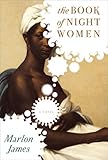
Lilith doesn't remember her mother or father. She has been raised by a slave, Circe, who pretty much does as she likes on a Jamaican sugar plantation as the century turns from 18th to 19th. The closest thing she has to a father, she thinks, is a slave who has lost his mind, and a few body parts, and who is reduced to living on a chain outside like a pitbull.
Lilith survives under the protection of head house slave Homer, a woman who runs the household with rigor and holds her back straight. She also often speaks in riddles to Lilith, leaving the girl to figure out for herself what evil lurks in every heart. Including, in harrowing episodes, Lilith's own.
That such a child not only survives, but works toward living life on her own terms as best she can, may not seem plausible. But Marlon James, a literature and creative writing professor, makes it believable in his second novel, The Book of Night Women. As her circumstances change, usually drastically and often for the worse, Lilith has little support working her way through the labryinth of feelings that confront a girl who becomes a woman, all the while never knowing true freedom to feel as she would like. Whether it's coming to terms for her feelings toward three important white men in her life or her sisters who seek revenge, Lilith has a lot to consider.
James has written a brutal, earthy and compelling narrative written in a dialect that forces a reader to either let the story flow over or to slow down and ponder what every nuance means not only to his heroine, but also to the reader. There is language certain to offend people, especially those who can't even handle Mark Twain. There is never getting away from the harsh brutality of what slavery means, of the cruel physical and psychological misery that one group of people can do to another group, or one individual to another. The inability of the white people in the story to not understand that they haven't earned loyalty and affection after the whippings and rapings, and worse, is but one part of this massive story that has repercussions to this day.
The beauty of this novel is that the author does not have to stand on a soapbox. The reality of the way people were treated speaks for itself. What James has done is to bring to vivid life the emotions and feelings of characters who are part of it without having a say in their place. And this includes some white characters as well as the slaves. That not many of the characters can handle their fate well does not mean their stories are not worth telling.Buy The Book of Night Women!
ไม่มีความคิดเห็น:
แสดงความคิดเห็น